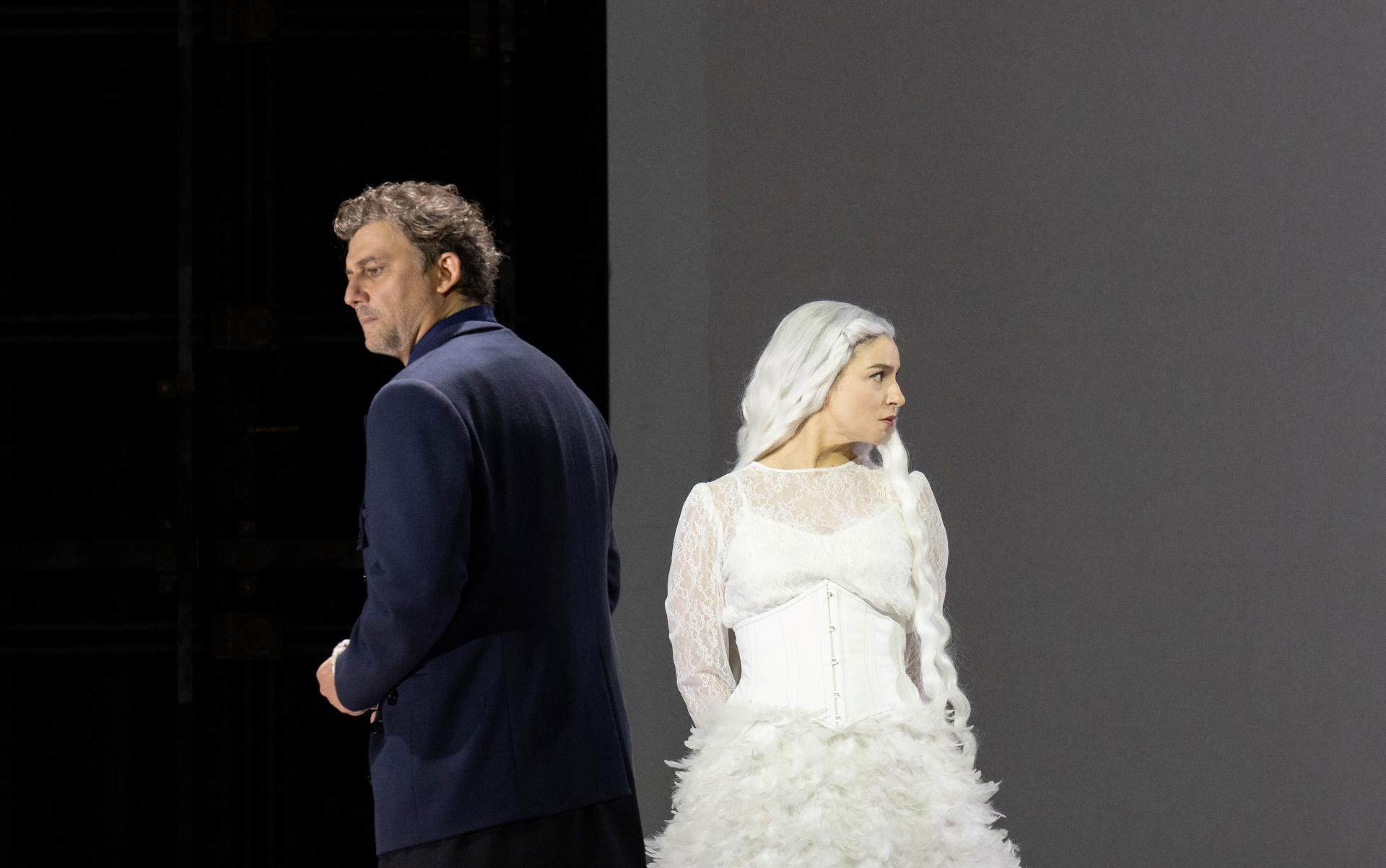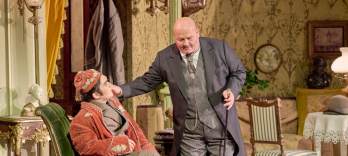Turandot
Mo | Tu | We | Th | Fr | Sa | Su |
Synopsis
ACT 1
The Mandarin proclaims the law: Princess Turandot will become the wife of the prince who can solve three riddles she sets him.
If he does not succeed, he will be executed. The Prince of Persia has just tried his luck and failed. The crowd cries out for the executioner. Against this backdrop, Calaf meets his father Timur, the dethroned king of the Tartars.
Timur, who was thought to be dead, was brought to safety after his fall by the slave Liù, who has been looking after him ever since. When Calaf asks about the reasons for this sacrifice, Liù explains that Calaf once smiled at her in the palace. The Prince of Persia is led to his execution. At the sight of him, the previously bloodthirsty crowd begs for mercy for him.
Calaf also joins in with these cries. But when he sees Turandot, he immediately falls in love with her and now wants to face her riddles himself. The ministers Ping, Pang and Pong try to dissuade him from his plan. Liù and Timur beg him to reconsider. But Calaf has made up his mind and will accept the challenge.
ACT 2
Ping, Pang and Pong ponder the many princes who have already lost their lives trying to win Turandot and dream of their own private happiness.
The ordeal begins. Altoum, Emperor of China and Turandot's father, is tired of the battle. He asks Calaf to give up and leave. Calaf insists on the test. Once again, the Mandarin proclaims the law.
Turandot explains the background: thousands of years ago, her ancestor Lo-u-ling was abducted, raped and killed by a man. Now she is taking revenge on the princes who are courting her. No one will ever possess her. Calaf asks her to solve the riddles. To Turandot's horror, he finds the right answer three times.
The princess begs her father not to hand her over to the foreign prince, but he refuses, saying that the oath he has sworn is sacred. But when Turandot asks Calaf if he wants to make her his wife by force, he says no; he wants to be loved by her. He offers a way out: If she succeeds in finding out his name before daybreak, he will resign himself to his fate.
ACT 3
The whole town is feverishly trying to find out Calaf's name. Turandot has announced executions if they don't succeed.
Ping, Pang and Pong try to bribe Calaf, then appeal to his pity; all in vain. When the crowd is ready to use force, the henchmen drag Timur and Liù in. Calaf immediately denies any connection, but the ministers know that the two know Calaf and can give his name.
Turandot does everything she can to make Timur speak. To protect him, Liù declares that she alone knows the prince's name - but she refuses to reveal it, even under threat of torture. When Turandot asks about the source of her strength, she replies that it is love. She prophesies to Turandot that she too will love and then takes her own life. Calaf and Turandot are left alone amidst the general consternation.
Furthermore, she does not want to submit to Calaf. The kiss he steals from her changes the situation. She cries her first tears and confesses that she feared him, but also loved him. He should be satisfied with that and go away with his secret. He, on the other hand, places his life in her hands by voluntarily revealing his name: Calaf, son of Timur. At the decisive ceremony that follows, Turandot declares to her father, the Emperor, that she now knows the name of the stranger; it is »love«.
ACT 1 & 2 - 80 MIN
INTERMISSION - 25 MIN
ACT 3 - 45 MIN
Program and cast
Season 23/24
Turandot: Asmik Grigorian
Altoum: Jörg Schneider
Timur: Dan Paul Dumitrescu
Calaf: Ivan Gyngazov
Liù: Kristina Mkhitaryan
Mandarin: Attila Mokus
Ping: Martin Häßler
Pang: Norbert Ernst
Pong: Hiroshi Amako
Musical direction: Axel Kober
Direction: Claus Guth
Stage: Etienne Pluss
Costumes: Ursula Kudrna
Choreography: Sommer Ulrickson
Light: Olaf Freese
Video: rocafilm
Dramaturgy: Konrad Kuhn
Season 24/25
Turandot: Elena Pankratova
Timur: Dan Paul Dumitrescu
Calaf: Michael Fabiano
Liù: Selene Zanetti
Musical direction: Carlo Rizzi
Direction: Claus Guth
Stage: Etienne Pluss
Costumes: Ursula Kudrna
Choreography: Sommer Ulrickson
Light: Olaf Freese
Video: rocafilm
Dramaturgy: Konrad Kuhn
Vienna State Opera
Public Transport
Subway lines: U1, U2, U4
Trams: 1, 2, D, J, 62, 65
Buses: 59A
Local Railway: Badner Bahn
Stops: Karlsplatz / Opera
Taxi stands are available nearby.
Parking
Parking is only € 6, - for eight hours!
The Wiener Staatsoper and the ÖPARK Kärntner Ring Garage on Mahlerstraße 8, under the “Ringstraßengalerien”, offer the patrons of the Vienna State Opera a new, reduced parking fee. You can park in the Kärntner Ring Garage for up to 8 hours and pay only a flat fee of € 6, -. Just validate your ticket at one of the discount machines inside the Wiener Staatsoper. The normal rate will be charged for parking time greater than 8 hours. The validation machines can be found at the following coat checks: Operngasse, Herbert von Karajan-Platz, and the right and left and balcony galleries.
Important: In order to get the discount, please draw a ticket and do not use your credit card when entering the garage!
After devaluing your ticket in the Wiener Staatsoper you can pay comfortably by credit card or cash at the vending machines.
The machines accept coins and bills up to 50.- Euro. Parking time longer than 8 hours will be charged at the normal rate.
History
The structure of the opera house was planned by the Viennese architect August Sicard von Sicardsburg, while the inside was designed by interior decorator Eduard van der Nüll. It was also impacted by other major artists such as Moritz von Schwind, who painted the frescoes in the foyer, and the famous "Zauberflöten" (“Magic Flute”) series of frescoes on the veranda. Neither of the architects survived to see the opening of ‘their’ opera house: the sensitive van der Nüll committed suicide, and his friend Sicardsburg died of a stroke soon afterwards.
On May 25, 1869, the opera house solemnly opened with Mozart's Don Giovanni in the presence of Emperor Franz Joseph and Empress Elisabeth.
The popularity of the building grew under the artistic influence of the first directors: Franz von Dingelstedt, Johann Herbeck, Franz Jauner, and Wilhelm Jahn. The Vienna opera experienced its first high point under the direction of Gustav Mahler. He completely transformed the outdated performance system, increased the precision and timing of the performances, and also utilized the experience of other noteworthy artists, such as Alfred Roller, for the formation of new stage aesthetics.
The years 1938 to 1945 were a dark chapter in the history of the opera house. Under the Nazis, many members of the house were driven out, pursued, and killed, and many works were not allowed to be played.
On March 12, 1945, the opera house was devastated during a bombing, but on May 1, 1945, the “State Opera in the Volksoper” opened with a performance of Mozart's THE MARRIAGE OF FIGARO. On October 6, 1945, the hastily restored “Theaters an der Wien” reopened with Beethoven's FIDELIO. For the next ten years the Vienna State Opera operated in two venues while the true headquarters was being rebuilt at a great expense.
The Secretary of State for Public Works, Julius Raab, announced on May 24, 1945, that reconstruction of the Vienna State Opera would begin immediately. Only the main facade, the grand staircase, and the Schwind Foyer had been spared from the bombs. On November 5, 1955, the Vienna State Opera reopened with a new auditorium and modernized technology. Under the direction of Karl Böhm, Beethoven’s FIDELIO was brilliantly performed, and the opening ceremonies were broadcast by Austrian television. The whole world understood that life was beginning again for this country that had just regained its independence.
Today, the Vienna State Opera is considered one of the most important opera houses in the world; in particular, it is the house with the largest repertoire. It has been under the direction of Dominique Meyer since September 1, 2010.
Performances: We 05 Mar 2025,
Performances: Sa 27 Jul 2024,
Performances: Tu 31 Dec 2024,
Performances: Th 14 Nov 2024,
Performances: Th 07 Nov 2024,
Performances: Mo 17 Mar 2025,

 EN
EN DE
DE IT
IT FR
FR ES
ES RU
RU JP
JP RO
RO
 Seating plan
Seating plan 




